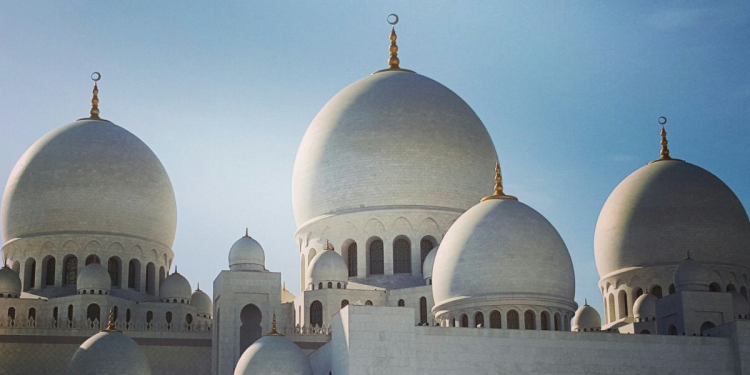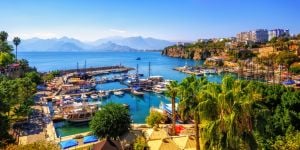
Since 2008, Jo has been living in Abu Dhabi, UAE's capital city. The Filipino expat opens up to Expat.com, and discusses everyday life in the UAE for a non-Muslim expatriate, and all the things that make this country a good place to live in.
Hi Jo, can you introduce yourself, and tell us about your projects in Abu Dhabi?
I am Jo, blogging for Witsandnuts semi-anonymously due to the nature of my full-time work. In the winter of 2008, I accepted a consulting job offer in Abu Dhabi, the capital of the UAE. After almost two years, I got into my current job that primarily requires a huge amount of analysis, and collaboration with colleagues and external parties.
My blog is one of my means to keep in touch with people who know me personally, and to share information with those who might be interested in life in the UAE, or my occasional travels in other countries.
Why did you choose to live in the UAE?
It was not planned at all. I was very much content with my life in the Philippines. But then, in late 2007 I started exploring opportunities in the Netherlands and New Zealand — just to test my marketability, modesty aside. However, to be in the Middle East had never been an option, since I am one of those, who had plenty of misconceptions about it. I had imagined it to be all desert, not to mention the brutal weather during the summer.
I did not even know the UAE — I had only heard of Dubai then, which I believed it was a country, and not a city and an Emirate. But it all changed when a colleague, who is based in Abu Dhabi, asked me to send her my CV after checking my Linkedin account. She was asked by her Director to recommend somebody for specific job requirements. I wasn't interested, but she insisted, and several telecons followed. In a whirlwind turn of events, I refused the job offer from the Netherlands, and I said to myself: ‘Why not give UAE a try? I can come back at anytime, if things don't work out.' So, I chose the once improbable, and grabbed the opportunity to live and work in the UAE. Since 2008, it has been an exceptional experience.

How were your first steps in the country? Was it easy to find accommodation, and to integrate in the Emirati society?
Since I was moving with my family, before coming to the UAE, I coordinated my accommodation, made arrangements with the school, found house help, etc. I found it quite easy to integrate with the Emiratis, as they are very welcoming. However, I identified at an early stage that the more challenging part was (and sometimes still is) connecting with other expats — particularly those who have superiority complex, or are threatened by my existence as a professional or as an individual.
As I look back now, it was a breeze integrating with the Emirati society maybe because of my adaptive nature. I love learning about new cultures, and overcoming challenges — including learning a new language, such as Arabic. Of course, it was not a bed of roses throughout. I found my first Ramadan quite difficult. For several days, I had to eat hidden in the toilet because I had nowhere else to eat! In the next years, our office dedicated eating areas to non-Muslims, and most of the restaurants are opened now during Ramadan, so it is manageable. The surprising thing is that over the past three years, I am looking forward to — even love — Ramadan.
Getting better at understanding and reading Arabic is a constant struggle. At certain sectors the meetings must be conducted in Arabic, as well as some documentation and paperwork, but I am privileged that translation is available for expats.

How will you describe the Emirati culture?
The Emirati culture is relatively easy to understand and appreciate. It is like my favourite Arabic food so far, shish taouk (different from shawarma) — there is a portion of it that you may not be able to swallow at first, but as you give it another try, you will resonate with it. A taste that reminds you of home, but then you take another bite, which is totally foreign but good.
For example, the restrictions on taking pictures, the food, any display of affection, all may feel suffocating in the beginning. On the other hand, the regulation that forbids begging, the safe environment, the respectful culture to families and women are remarkable. Once an expat opts to empathise with the locals, and to understand the rationale behind some practices and regulations, will see that to a certain extent things make sense. Believe it or not, the Emirati culture has turned into a fusion, since the majority of the UAE population are expatriates from at least 72 countries.
What does your everyday life look like in Abu Dhabi? How different is the Emirati rhythm?
The call to prayer coming from the mosques has become music to my ears (although I am not a Muslim), as opposed to being irritated by it when I first arrived. The drive to work is an everyday adventure, particularly in the Holy Month of Ramadan, when fasting makes some drivers more impatient. You can easily identify the nationality of the people around you by the way they dress and drive — some drive like they own the road, and some are so careful, well, so slow.
I have a morning to afternoon job where I interact five times a week with both the Emiratis and expats. Friday and Saturday is the weekend, but for some sectors Saturday is a working day. It is interesting to note that on Friday, which is considered a church and worship day, people from different nations, cultures, and ideologies gather at the mosques and churches, which are situated close to each other. It is a sight and an experience to cherish because Muslim and non-Muslim get the chance to congregate, and forget about their differences.
What residents do on a daily basis after work and over the weekend is influenced by the weather — do not forget sandstorms. The UAE has a lot to offer in terms of indoor and outdoor activities. My favourite activity is going to the beach and to the parks. It makes me sad though that the community is not yet dog and cat friendly unlike in other countries. Hence, I am forced to leave them in the apartment. I move around by car rather than public transport, as petrol is cheap. However, we have experienced price adjustments a few times already. The UAE's proximity to nearby countries triggers curiosity, and some expats are seriously bitten by the travel bug, and are making the most of the affordable air fares.

The country is composed of several Emirates. Are there any differences among them — cultural and historical?
It is important to note that all seven Emirates (Abu Dhabi, Dubai, Sharjah, Ras Al Khaimah, Fujairah, Ajman, Umm Al Quwain) in the UAE were fishing villages until the discovery of oil. The oil reserves brought progression to the Emirates, and the lifestyle changed a lot from the nomadic lifestyle of the Bedouins.
The Emirates are culturally similar, and historically interrelated. “From Rags to Riches'' is an excellent book, which talks about the humble beginning of the UAE. While there is one united federal government, there are local governments that govern each one of the Emirates. For example, parking and rental regulations in Abu Dhabi and Dubai might be different to the regulations in the other Emirates. Thus, the differences in local governance, may influence residents' preferences as to where they would like to work, live, and spend the weekend.
While Abu Dhabi is the largest among the Emirates, and the capital of the UAE, its neighbour, Dubai, is viewed as the most ambitious Emirate. Dubai is well known for its mega projects, such as the tallest building in the world, the biggest mall etc. Abu Dhabi is considered to be more conservative and prudent in terms of decision making and financial management. Abu Dhabi's priority is the satisfaction of its citizens and residents through housing projects, and urban planning that incorporates cultural, financial, and entertainment districts.
Both Abu Dhabi and Dubai are assisting the other Emirates to maximise their own potential and resources — Ras Al Khaimah its beautiful flora and fauna, and Sharjah its cultural happenings. Just like in other countries, the citizens of the UAE tend to create impressions about each other, depending on the tribe and the Emirate they come from.

Do you have knowledge of the local job market? What are the most dynamic economic sectors?
The oil and gas industry, customer service, health care, real estate, and consultancy remain the most thriving sectors. However, any existing and soon-to-be-expatriates should be well-equipped with knowledge, skills, and hold the cultural advantage — previous experience of working with UAE nationals, and basic knowledge of Arabic — which can be further developed through time.
The compensation package is better at the government sector because of the added benefits, such as education and housing allowance, and leaves. I don't mean to discourage anyone, but given the economic challenges worldwide, people should take into account that both the private and government sectors are continuously strategizing on cutting costs. At the end of day, being an expat in the UAE is expected to remain an attractive option due to the tax exemption benefits and the not so high cost of living. We have heard news that taxes will be rolled out in some products (liquor) and services in the coming years, but taxes on personal income will remain zero.
What about local sports in the UAE?
While the UAE is a huge fanatic of football (Abu Dhabi owns the Manchester City Club in England) and car racing (the Yas Marina Circuit was built in Abu Dhabi to host the Grand Prix in 2010 along with the grand opening of Ferrari World), it is interesting to also note the UAE's fascinating local sports — falconry, camel, and boat racing. For any visitors and expats, it is recommended to visit the Falcon Hospital camel tracks and the annual boat competition at The Corniche.
Any advices for a soon-to-be expatriate in the UAE?
Keep track of your long and short-term goals. The UAE is an excellent country to learn and grow professionally, and on a personal level. At some point it tends to be a fairy tale due to indescribable blessings, temptations, and challenges. Whether you like fairy tales or not, it is up to you to write your own happy ending.
Being an expat requires a certain amount of humility and assertiveness. Each day, look for opportunities that will make your home country proud of you by bringing integrity and cheer in your own ways. Do not forget where you came from. You are an expat on a mission, and you should have an exit plan — a graceful and respectful one.




















Comments